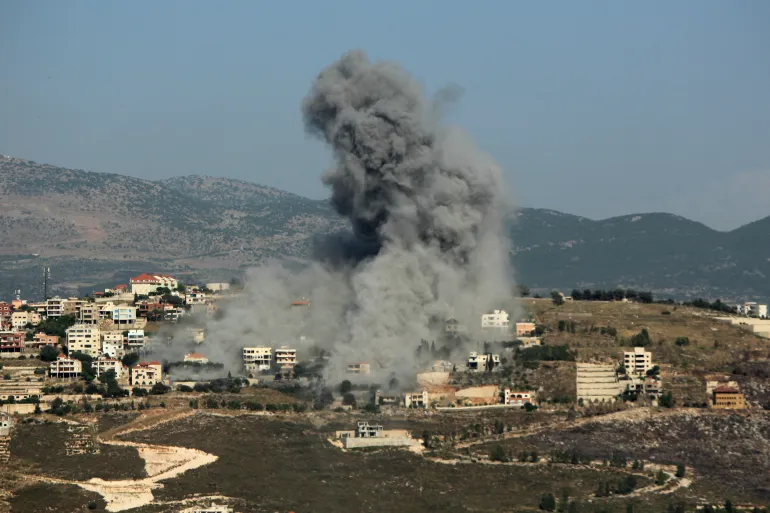
After radios go off, Israeli planes hit southern Lebanon
Israel bombed southern Lebanon on Thursday and said it had stopped an Iranian-led plan to kill someone. This came a day after Hezbollah radios and booby-trapped pagers went off, sending the two sides hurtling toward war.
Over two days, clever attacks on the armed group Hezbollah’s communications equipment killed 37 people and hurt about 3,000 more. The attacks caused chaos in Lebanon, and scared people gave up their cell phones.
“This is war, not a small matter.” Now, who can even keep their phone safe? “When I heard what happened yesterday, I locked my phone on my bike and walked away,” Mustafa Sibal said on a street close to the city center of Beirut.
In Beirut, people could hear a faraway roar in the sky. The sound was said to be Israeli jets breaking the sound barrier, which is a sound that has been heard more and more these past few months.
Israel said that its jets hit villages in southern Lebanon overnight. A security source and Hezbollah’s al-Manar TV said that airstrikes near the border started up again on Thursday just after noon.
Hezbollah hand-held radios went off across the south of Lebanon on Wednesday. The Lebanese health minister said that 25 people had been killed and 608 were hurt in the country’s deadliest day since militants and Israel started fighting across the border during the Gaza war last year.
The day before, hundreds of pagers, which Hezbollah used to avoid being caught on cell phone monitoring, went off at once, killing 12 people, including two children, and hurting over 2,300.
Lebanese Prime Minister Najib Mikati wrote on X that the UN Security Council needs to take strong action to stop Israel’s “aggression” and “technological war” against his country.
Israel hasn’t said anything directly about the walkie-talkies and pagers that were set off by bombs, but several security sources have said that the attacks were carried out by Israel’s Mossad spy agency.
Israel says that its fight with Hezbollah and its war in Gaza against the Palestinian militant group Hamas are both part of a bigger battle with Iran in the region. Iran supports both Hezbollah and armed movements in Syria, Yemen, and Iraq.
Israeli security officials said Thursday that a businessman from Israel was caught last month after going to at least two meetings in Iran where he talked about killing Prime Minister Benjamin Netanyahu, the defense minister, or the head of the Shin Bet spy agency.
Shin Bet found what it said was a plan by Hezbollah to kill Moshe Ya’alon, who used to be the Defense Minister.
Israel has been blamed for killing people, including a blast in Tehran in July that killed the leader of Hamas and another in a suburb of Beirut that killed a top Hezbollah commander just hours apart.
A spokesman for the U.N. peacekeeping operation in southern Lebanon said that it had “not changed much in terms of exchanges of fire between the parties” along the border, despite what had happened in the past few days.
“There was a rise in intensity last week. It’s pretty much the same this week. Fire fights are still going on. The tone of the speech is still high, and it is still worrying,” the spokeswoman, Andrea Tenenti, told Reuters.
Israel and Hezbollah have been firing at each other across the border between Israel and Lebanon. This is happening at the same time that Israel is fighting a war in Gaza against Hamas, the Palestinian terrorist group whose members attacked Israel on October 7.
People on both sides of the line between Israel and Lebanon have had to leave their homes. Netanyahu promised on Wednesday to restore “securely to their homes” the Israelis who had to leave their homes.
Shifting the focus
Hezbollah targets were hit overnight by Israeli airstrikes in southern Lebanon, including those in Chihine, Tayibe, Blida, Meiss El Jabal, Aitaroun, and Kfarkela. An Israeli airstrike also hit a Hezbollah weapons storage center in the Khiam area.
Anti-tank missiles fired from Lebanon were said to have hurt several Israeli citizens, but this was not confirmed by the government.
Israeli Defense Minister Yoav Gallant said on Wednesday that the war was entering a new phase and that more troops and resources were being sent to the northern border.
Israeli officials say that the 98th Division, an elite group of commandos and paratroopers that has been fighting in Gaza, is one of the troops that are being sent there.
The day after Hamas’s attack on October 7, Hezbollah fired a lot of missiles at Israel. Since then, there has been a steady exchange of fire that neither side has let get out of hand.
But tens of thousands of people have been removed on both sides of the border, and the Israeli government is under more and more pressure to get them back home.
All Categories
Recent Posts
Tags
+13162306000
zoneyetu@yahoo.com



